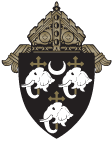Thanksgiving Day is our most popular national holiday. At an early age children in school learn the origin of the holiday, which is traced to the Pilgrims who settled the Plymouth Colony in Massachusetts. They had left their native land in search of a place where they would have freedom to practice their religion. That first Thanksgiving meal is a testimony to their having achieved that freedom. They publicly expressed their thanks to God for the blessing of the bounty they had received from God. Their gratitude to God was also expressed by sharing that bounty with the Native Americans whom the tradition places at the table for the first Thanksgiving meal.
The Pilgrims were people of strong Christian faith who knew what was owed to God — gratitude. It is reported that the Native Americans also had traditions that gave thanks for the Creator’s gifts of a successful harvest. Though the date of the feast changes each year, its purpose does not. It is to give Thanks to God.
Is the religious dimension of the national holiday recognized and observed in our time? Or, have references to giving thanks to God been erased from its observance? To give thanks to God is what motivated the Pilgrims to organize the day, and thanking God was found in the customs of the native peoples. Further, to give thanks to God on the last Thursday of November is found in the original declaration of the national holiday by President Lincoln in which God is referred to a number of times.
Should we be concerned that references of giving thanks to God are disappearing from public discourse? I think we should, and that concern should make us more determined in our celebration of the national holiday to get the focus correct — on giving thanks to God.
This happens in many of our parishes where the celebration of Mass is offered with solemnity on the evening before or on the morning of the holiday. The parish family comes together around its family table, the Altar of the Church, to publicly give God Thanks. In some communities Thanksgiving to God is offered in an interfaith service which is an important testimony to the place of religion in our American society. Let us resolve to do this at our family table on Thanksgiving Day and other festive occasions. Make sure that Grace before meals is prayed. Some families have a beautiful custom in which each member from the youngest to the oldest speaks aloud his or her gratitude to God for something or for someone in their lives. To name a blessing is to own it. To share it with others is even more powerful.
Having experienced great sufferings during their journey across the ocean and despite the severe hardships of establishing themselves in a new land, the Pilgrims knew that God deserved thanks. They knew what was owed to God — gratitude. May we come before God with an attitude of gratitude. Despite our disappointments and sufferings, may we recognize the blessings we have received from God and be able to say Thank You. This is all we can give to God who gives us so much.
Gratitude is what is due to God. We show it in prayer and in our concern for others, especially the less fortunate. Charity is an expression of giving thanks to God. Charity is evident in the wonderful projects of Thanksgiving baskets and food drives that are organized in many of our parishes. The faithful donate all sorts of foods that are delivered to deserving families so that they too can enjoy a celebratory meal on the national holiday.
The focus of this national holiday is to give God thanks for the many gifts we have received. To be thankful to God who gives us so much as individuals, as family, as a nation, and as a church. We are the recipients of God’s gifts. We have been given many blessings. For these let us celebrate the holiday giving thanks to God.
Happy Thanksgiving Day to you.
Most Reverend Dennis J. Sullivan, D.D.
Bishop of Camden
